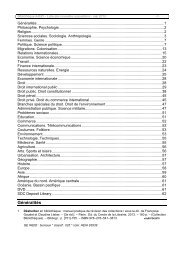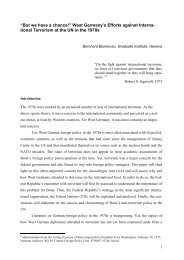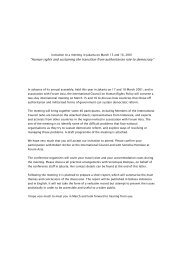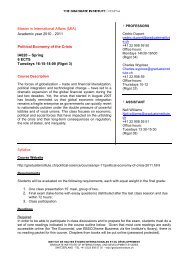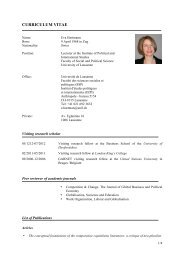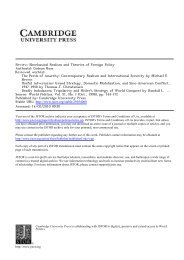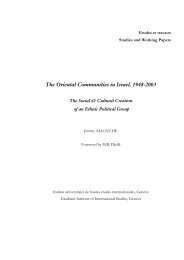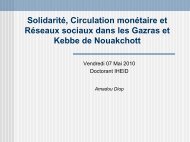Download [pdf] - The Graduate Institute, Geneva
Download [pdf] - The Graduate Institute, Geneva
Download [pdf] - The Graduate Institute, Geneva
Create successful ePaper yourself
Turn your PDF publications into a flip-book with our unique Google optimized e-Paper software.
EUROPEAN SECURITY IN NATO’S SHADOW<br />
PARTY IDEOLOGIES AND INSTITUTION<br />
BUILDING<br />
Stephanie Hofmann<br />
NATO has been a successful forum for managing European security policy. Yet European governments<br />
have repeatedly tried to build a new security institution in NATO’s shadow. In this innovative<br />
book, Stephanie Hofmann asks why governments attempted to create an additional institution<br />
despite no obvious functional necessity, and why some attempts failed while others succeeded.<br />
European Security in NATO’s Shadow considers security cooperation through the lens of party ideologies<br />
to shed new light on these questions. <strong>The</strong> author observes that political parties are motivated<br />
to propose new institutions by their multi-dimensional ideologies. Moreover, the success of efforts<br />
to create such institutions depends on the degree of ideological congruence among parties in power.<br />
In particular, the relationship between the values of multilateralism, sovereignty and Europe informed<br />
the impetus and success rate of the attempts made during negotiations for the Maastricht, Amsterdam<br />
and Nice treaties to create a European security institution.<br />
Cambridge: Cambridge University<br />
Press. 2013. 280 p.<br />
GLOBAL HEALTH DIPLOMACY<br />
CONCEPTS, ISSUES, ACTORS,<br />
INSTRUMENTS, FORA AND CASES<br />
Edited by Ilona Kickbusch, Graham Lister, Michaela Told, and Nick Drager<br />
Social and environmental crises, global trade and politics, and major epidemics are making public<br />
health a pressing global concern. From this constantly changing scenario, global health diplomacy<br />
has evolved at the intersection of public health, international relations, law, economics, and management.<br />
It is a new discipline with transformative potential.<br />
Global health diplomacy relates to health issues that cross national boundaries, are global in nature<br />
and require collective action to address them. It has become a complex undertaking demanding new<br />
skills from diplomats and health officials. This textbook is a response to these new needs: it attempts<br />
to share the knowledge and experience of practicing officials and academics working in this evolving<br />
field to develop the art and science of global health diplomacy.<br />
New York: Springer. 2012. 363 p.<br />
Global Health Diplomacy serves as a guidebook for in depth learning on key issues, such as<br />
<strong>The</strong> legal basis of global health agreements and negotiations<br />
Global public goods as a foundation for global health diplomacy<br />
Global health: a human security perspective<br />
Health issues and foreign policy at the UN<br />
National strategies for global health<br />
South-South cooperation and other new models of development<br />
LA REVUE DE L’INSTITUT I THE GRADUATE INSTITUTE REVIEW I GLOBE I N11 Printemps I Spring 2013<br />
35


![Download [pdf] - The Graduate Institute, Geneva](https://img.yumpu.com/23370020/36/500x640/download-pdf-the-graduate-institute-geneva.jpg)
